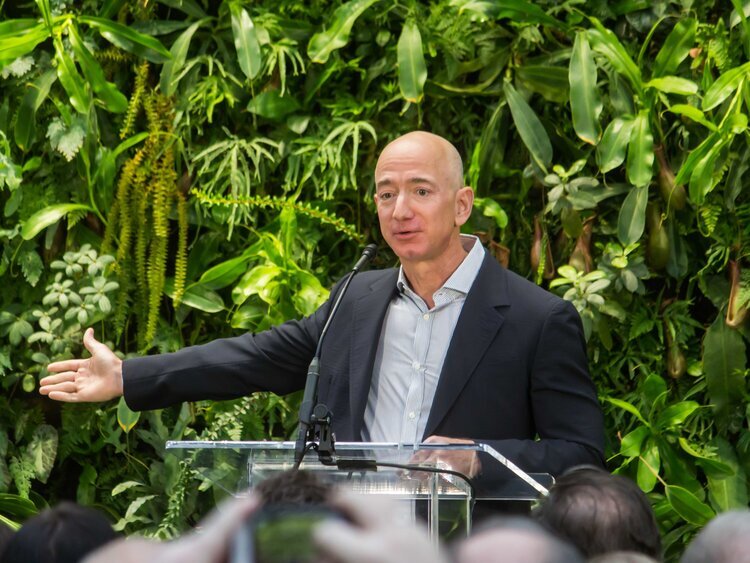Bezos’ Hypothetical Trillion and Those Who Will Suffer For It
Rachel Riddell, Print Staff Writer
September 7 2020
For many, a “billion” is a hard number to conceptualize. Recent reports of Amazon’s founder and CEO, Jeff Bezos, however, may beg us to begin understanding what a trillion is. According to Comparisun, an international company specializing in the analysis of POS systems, Bezos could become the first trillionaire by 2026 if his wealth continues growing at 34% a year. Currently, Bezos’ fortune stands at $150 billion, according to the Bloomberg Billionaires Index, meaning it has grown by 40.3 billion in 2020 alone. This number has been arguably inflated by many turning to online shopping throughout COVID-19 as Amazon has monopolized 50% of the e-commerce market. This estimation, whether accurate or not, comes at the expense of Amazon’s lengthy history of mishandlings with workers and other violations.
Despite this projection utilized as a topical point for former presidential candidates Bernie Sanders and Elizabeth Warren to tout, Comparisun’s reporting has ignited skepticism. Their calculation would only remain true if the American economy –– marked by its plasticity and fluctuation –– remained at the same rate, which is an extremely rare possibility. CNBC reporter Robert Frank explores that for this reality to come into fruition, Amazon would have to “reach a share price of more than $12,600 per share” for Bezos to hit the $1 trillion mark: it is currently at $2,377 per share. Statistics also reveal that “Amazon would need to reach a market value of nearly $11 trillion by 2026 to make its founder a trillionaire in line with Comparisun’s projection,” due to Bezos’ personal wealth being closely linked with Amazon’s market price. As the world has not fully undergone COVID-19’s impact on the economy, this calculation becomes even more audacious. It is also important to note that although this news story has only recently struck a chord with the public, business and financial analysts have analyzed Bezos hitting a trillion as early as 2016. RBC Capital’s managing director Mark Mahoney issued forecasts about this number at Business Insider’s IGNITION conference four years ago, when taking notice of Amazon’s dominance in the marketplace.
Regardless of whether or not he amasses a trillion fortune in the near future, consumers must be wary that Bezos’ immense wealth comes at the cost of poor labour practices and treatment of the company’s employees. For years, there has been criticism directed at the harsh and gruelling conditions of Amazon factories and their handlings with workers: since 2001 they have opposed the formation of trade unions. Despite workers conversing with big and often successful unions such as “the Teamsters, the United Food & Commercial Workers Union and the Retail, Wholesale and Department Store Union” and going on several strikes such as 2019’s Prime Day strike in Shakopee, Minnesota, these ambitions have gone without concrete action. Complaints have also risen about overheating in certain facilities: their Breinigsville warehouse in 2011 had reportedly gone up to 46°C, causing workers to pass out. Eric Spitznagel of the New York Post highlighted Emily Guendelsberger experience working at Amazon, and both the mental and physical tribulations it cost her and her coworkers. From watching a testimonial video of a worker who said they “lost 20 pounds” while working to further lamenting on the facility’s conditions, reporting on Amazon factories across the world have been consistent in their grim depictions. Although some argue Amazon has made strides in raising its minimum wage to $15 an hour and for “generous benefits”, for many it is not enough when compared to the magnitude of Bezos’ wealth at the cost of those who do most of the Amazon groundwork for him.
COVID-19 has brought on particularly new hardships for Amazon workers, even though the crisis has made Bezos richer. The news came out that two workers at their Staten Island facility had contracted the virus, but those who worked there claimed that this “number is understated.” Assistant manager of the location and organizer Chris Smalls led a protest in response to the company’s alleged mistreatment and lack of planning to combat the virus but was subsequently terminated. Amazon executives claim this was because he broke instructions to stay home after reportedly coming into contact with someone who carried the virus, but Smalls says they did not send him home until March 28, “three weeks after the exposure.” Smalls’ firing sparked contempt from Amazon workers, causing a series of more protests and outrage from the public. The New York state attorney general, Letitia James, called Amazon’s conduct “disgraceful.” The controversy even ignited internal issues as Amazon Web Services VP Tim Bray resigned in response to the company’s mishandling of the situation.
There has been insurmountable reporting for almost two decades now to reveal that Amazon’s working conditions and company responses are immensely flawed, yet Bezos’ fortune continues to grow and Amazon dominates e-commerce at an exceptional rate, There is no easy solution to dismantle Amazon’s throne, but as consumers, we can be smart and careful while navigating the online shopping world, research more ethical businesses and thoroughly engage with the information that has demonstrated to us that Amazon’s quick shipping is not enough to warrant support for the company. The concern should not be whether or not Bezos hits the trillion mark, but whether the workers that have allowed his fortune to expand will receive proper attention and care as long as Amazon exists.
